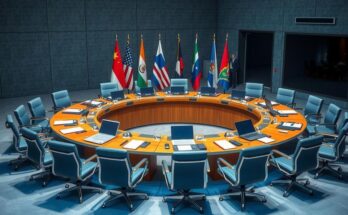The recent unlawful expulsion of 238 Venezuelan nationals from the U.S. to El Salvador fuels concern over human rights abuses. Despite a federal court order preventing their removal, these individuals were sent back, marking a troubling disregard for the legal system. Ana Piquer of Amnesty International highlighted that such actions not only undermine human rights obligations but also support President Bukele’s oppressive security agenda in El Salvador.
The expelled individuals, many amid legal proceedings or granted protections under international conventions, were swiftly labelled as gang members based on superficial evidence like tattoos. The U.S. Immigration and Customs Enforcement’s own admission revealed that many of those expelled had no criminal background, raising questions about their treatment. The expulsion process lacks the legal safeguards outlined in U.S. law, rendering it akin to indefinite imprisonment devoid of rights.
El Salvador, under President Bukele, has become emblematic of a disturbing trend of authoritarianism, prioritizing mass incarceration and conditional power over human rights. Amnesty International has documented the desolate conditions within Salvadoran detention centres, notably extreme overcrowding and a lack of proper medical care. Furthermore, over 300 individuals have reportedly died in state custody, some under mysterious circumstances, prompting widespread outrage regarding the humane treatment of detainees.
Connecting the dots, there is a shared thread between Bukele’s stringent security measures and the U.S. policy on migrants, both hinging on discriminatory criteria and a blatant absence of due process. Vulnerable groups in both nations face undue scrutiny, with Venezuelan nationals fleeing perilous conditions increasingly branded as criminals without solid justification, reflecting systematic injustices.
Fundamentally, the principle of non-refoulement forbids states from returning individuals to places where they could suffer severe human rights violations. The U.S. actions, in this case, not only contravene international law but also jeopardize the lives of those it has expelled. The plight of Venezuelan nationals is further complicated by the UNHCR’s clear stance against deportations, underscoring the urgency to halt such actions amid widespread rights violations in their homeland.
As El Salvador’s state of emergency continues unabated, it embodies a dangerous precedent in the Americas, with countries potentially mirroring these inhumane policies. To combat this erosion of rights, Amnesty International appeals for an end to unjust deportations and urges all nations to uphold fundamental human rights, ensuring safety and dignity for detained individuals.
The Salvadoran government must address its law enforcement practices and uphold due process without facilitating further human rights abuses. There is a crucial need for the U.S. to reverse illegal expulsions to El Salvador, respect judicial rulings, and restore the right to asylum, reaffirming the sanctity of human dignity across borders.
The article discusses the unlawful expulsion of 238 Venezuelan nationals from the U.S. to El Salvador, highlighting severe human rights concerns and violation of legal protocols. Amnesty International’s Ana Piquer criticizes these actions for undermining due process and endorsing oppressive governance in El Salvador. The ongoing humanitarian crisis reflects a troubling alignment of policies between the U.S. and El Salvador, warranting immediate action to protect vulnerable individuals.
In summary, the unlawful expulsions of Venezuelans by the U.S. to El Salvador expose severe violations of human rights and due process. These actions support oppressive governance and foster environments that disregard the safety and dignity of vulnerable individuals. Both countries must acknowledge and ameliorate their harmful practices to re-establish international human rights standards. Amnesty International’s calls for action are vital for ensuring justice and protecting those at risk, rendering this situation critical for migrant rights advocacy.
Original Source: www.amnesty.org



